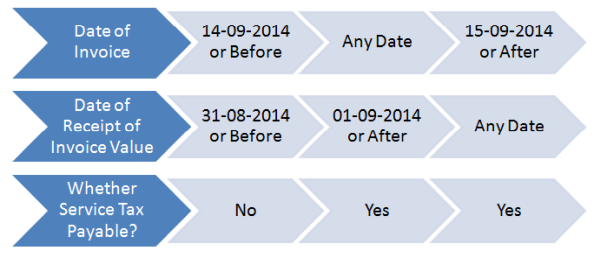1. Levy Vs. Collection of Service Tax - Concept
1.1 In any taxing statute, the statutory provision imposing levy of tax (i.e. the charging section) is of foremost importance. The parliament has levied service tax by enacting the Finance Act, 1994 by deriving its powers under Entry 97 (residuary powers) of the List – I (Union List) of the Seventh Schedule of the Constitution of India. To provide further necessary legal backup, the Government introduced a new Article 268A in the Constitution in the year 2003 by Constitution (Eighty-eighth Amendment) Act, 2003, which provides that taxes on services shall be charged by Union of India and shall be appropriated by Union of India and the States. Simultaneously, a new Entry 92C which reads “Taxes on Services” was also introduced in the Union List for the levy of service tax. Here, one must understand that the levy of service tax is on provision of service and not on the person providing the service.
1.2 It is well settled law that levy of tax is one thing and collection thereof is quite different thing. Once the levy is attracted, the collection of tax may be at any different point/stage or event. For example, in case of central excise duty, the levy is on the ‘manufacture or production of goods’ while the collection of duty is postponed till the time of removal of excisable goods. The point of collection is normally determined as per the sake of administrative convenience by the rules made in this behalf.
1.3 The Hon’ble Supreme Court of India in the case of Collector of Central Excise, Hyderabad Vs. Vazir Sultan Tobacco Co. Ltd. [2002-TIOL-215-SC-CX-LB] dated 28-02-1996 has long ago settled the law on this contentious issue and held that:-
“Once the levy is not there at the time when the goods are manufactured or produced in India, it cannot be levied at the stage of removal of the said goods. The idea of collection at the stage of removal is devised for the sake of convenience. It is not as if the levy is at the stage of removal; it is only the collection that is done at the stage of removal. Section 3(1) of the Central Excise Act says: “(1) There shall be levied and collected in such manner as may be prescribed duties of excise on all excisable goods other than salt which are produced or manufactured in India....” [Para 5]...
It is evident that the words “in such manner as may be prescribed” qualify the word “collected” and not the word “levied”. While the levy is created by Section 3 itself, the collection of the duty is left to be regulated by the Rules made under the Act. [para 7]...
The removal of goods is not the taxable event. Taxable event is the manufacture or production of goods. [para 11]”
2. Levy of Service Tax under the Finance Act, 1994
2.1 Section 66B is the charging section in the Finance Act, 1994 (hereinafter referred to as Act) which levy service tax on taxable services. It is quoted as below:
“66B. Charge of service tax on and after Finance Act, 2012. There shall be levied a tax (hereinafter referred to as the service tax) at the rate of twelve percent on the value of all services, other than those services specified in the negative list, provided or agreed to be provided in the taxable territory by one person to another and collected in such manner as may be prescribed.”
2.2 The literal interpretation of the charging section means that the levy of service tax is on the service ‘provided or agreed to be provided’. However, the collection of service tax may be shifted to any stage/event, in any manner, as prescribed by the rules made in this behalf. In simple words, applying the ratio of the apex court judgement in the case of Vazir Sultan Tobacco Co. Ltd. (supra), the levy is created by the charging section 66B itself and the collection of tax is left to be regulated by the rules made under the Act.
2.3 The Hon’ble Supreme Court of India in the case of Association of Leasing & Financial Service Companies Vs. Union of India [2010 (20) STR 417 (SC)] observed that the taxable event under the service tax law is the rendition of service.
2.4 The Supreme Court in the case of All India Federation of Tax Practitioners Vs. Union of India, referred to the Constitution Bench of this Court and held that “a tax on a thing or goods can only be with reference to a taxable event but there is a distinction between such a tax and a tax on the taxable event. In the first case, the subject-matter of tax is the goods and the taxable event is within the incidence of the tax on the goods. In the second case, the taxable event is the subject-matter of tax itself... In the present case, tax falls on the activity which is the subject-matter of service tax. In other words, we are substituting the word "service" in place of "goods" by applying the principle of equivalence. Under the Act, the Taxable Event is each exercise undertaken by the service-provider in giving advice on tax planning, auditing, costing etc. It is the said principle of equivalence which equates "service tax" to the Central Excise Duty; one taxes the provision of services and other production of goods”.
2.5 In the light of the above discussion, it can be interpreted that the levy of service tax is on the provision of service and the date of issue of invoice or date of payment are absolutely irrelevant. It means that if at the time of rendering of service, the levy was not there but subsequently at the time of issue of invoice or payment or both, the levy was introduced, then also that service should not be subjected to tax and no liability of payment of tax arise.
3. Point of Taxation Rules, 2011 – Rule 5
3.1 The Rule 5 of Point of Taxation Rules, 2011 determines payment of tax in case of new services and is quoted as below:
“5 Payment of tax in case of new services: Where a service is taxed for the first time, then-
(a) no tax shall be payable to the extent the invoice has been issued and the payment received against such invoice before such service became taxable;
(b) no tax shall be payable if the payment has been received before the service becomes taxable and invoice has been issued within fourteen days of the date when the service is taxed for the first time.”
3.2 In other words, this rule states that in cases of levy on new services, irrespective of date of completion of service, the service tax shall be payable if the payment is received on or after the date of levy or if the invoice is not issued within 14 days of date of levy.
3.3 For example, the Union Budget 2014-15 presented by the Finance Minister on 10-07-2014 and as passed by the Lok Sabha on 25-07-2014 has proposed to amend negative list i.e. section 66D(g) to extend new levy to advertisements in internet websites, on film screen in theatres, bill boards, conveyances, buildings, cell phones, Automated Teller Machines, tickets, commercial publications, aerial advertising, etc. This change will come into effect from a date to be notified later, after the Finance (No.2) Bill, 2014 receives the assent of the President. Suppose, the government notifies the effective date from say 01-09-2014 and above services become taxable for the first time, then the liability of payment of service tax as per Rule 5 is as illustrated below:

From the above example, it can be seen that:
1. If the newly taxable service is completed and invoice issued before the date of levy, but only because the payment is received after the date of levy, service tax becomes payable.
2. If the newly taxable service is completed and payment received before the date of levy, but only because the invoice is issued after 14 days of the date of levy, service tax becomes payable.
3.4 Note: Any service listed in Negative List is not a ‘Taxable Service’ as it is outside the scope of charging section 66B of the Act. Any service which is not listed in the negative list but is exempted otherwise from payment of service tax like vide mega exemption notification no. 25/2012-ST dated 20-06-2012 is still a ‘Taxable Service’ but exempted from payment of tax.
4.Why Rule 5 is Ultra-Vires the Finance Act, 1994?
4.1 In my view, the said Rule 5 of Point of Taxation Rules, 2011 seems to be ultra-vires the Finance Act, 1994. Let’s examine why?
The power to make rules has been conferred on the Central Government under section 94 of the Act as under:
“94. Power to make rules. –
(1) The Central Government may, by notification in the Official Gazette, make rules for carrying out the provisions of this Chapter.
(2) In particular, and without prejudice to the generality of the foregoing power, such rules may provide for all or any of the following matters, namely: -
(a) collection and recovery of service tax under sections 66B and 68;…
(hhh) the date for determination of rate of service tax and the place of provision of taxable service under section 66C;”
In exercise of the powers conferred as above, under section 94(2)(a) and (hhh), the Central Government has issued Notification No. 18/2011 dated 01-03-2011 which is known as Point of Taxation Rules, 2011 (hereinafter referred as POT Rules) and is made effective from 01-04-2011.
Under Rule 2(e) of POT Rules, the 'Point of Taxation' means the point in time when a service shall be DEEMED to have been provided.
4.2 The most important point to observe is that the POT Rules have been issued specifically using the powers for the purposes of collection and recovery of service tax and for determination of rate of service tax. By necessary implications, this delegated legislation cannot be extended to determine the date of levy of service tax and the deemed date of provision of service as per POT Rules should not be applicable for determining the date of levy on new services.
4.3 On the basis of above discussion and analysis, it seems that the Rule 5 of POT Rules, 2011 is ultra vires the Act as it exceeds the powers under which it is framed and empower to levy tax on new services based on date of invoice and date of receipt of value of service while completely ignoring the date of completion of service which is the taxable event. This rule wrongly empowers the revenue authorities to collect and recover tax in a situation when at the time of completion of service, there was no levy of service tax on the ground that either the payment was received on or after the date of levy or that the invoice is issued after 14 days of date of levy.

Author: Manoj Agarwal
Address: Ganpati Campus, Lal Building Road, Rourkela – 769012
E-mail: ServiceTaxExpert@yahoo.com, tax2001-it@yahoo.com
Kindly send E-Mail for further clarifications.
Disclaimer: This article is the property of the author. No one shall publish, reproduce or use it in any manner, for commercial purposes, without the permission of the author. The author shall not be responsible or liable for anything done or omitted to be done on the basis of this article.
THANK YOU FOR READING
KINDLY GIVE YOUR VALUABLE COMMENTS








 CAclubindia
CAclubindia

